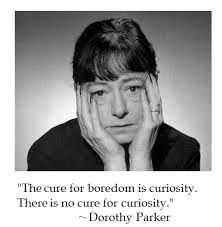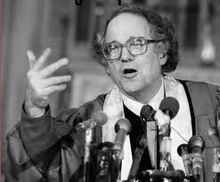I likely should have been more familiar with William Sloane Coffin. (I even missed his death this year, an important passage in American life.) I’m old enough, for one thing, although his greatest public attention came when I was still defining student activism, say, as careening on crutches around Mrs. Whitelaw’s class. As a quote-scavenging young teacher, though, I came to appreciate Coffin jewels like these, even when I was fuzzy about who the author actually was: Even if you win the rat race, you’re still a rat and Every nation makes decisions based on self-interest and then defends them in the name of morality. The dude could write.
The July edition of Harper’s Magazine has its “national correspondent” and beloved former editor Lewis Lapham coming from burying Reverend Coffin to praise his greatness in a piece called “Class Act”. (It takes one to know one.) He begins this way: “Among the voices of conscience speaking truth to power during the raucous decade of the 1960s, none was more impassioned or as often heard as that of William Sloane Coffin Jr., the once-upon-a-time chaplain of Yale University who died on April 12…” For Lapham and many others, the funeral had been a chance to meditate upon the silence of a great voice, noting that “the fact of his death prompted the latter-day custodians of liberal opinion…to wonder…where was Bill Coffin now that he was so sorely missed?” One eulogist said of Coffin, “There burned in his heart a sacred rage”; another called him “a first white man to stand with blacks…a patrician who was tribune of the nobodies…a critical thinker with a simple faith…”
How often do we hear of someone straddling those apparent paradoxes now? (Or ever?) Sacred rage. A thinker with faith. A child of wealth who went on to “tell the rich of the midnight sighing of the poor”, as Bahá’u’lláh once put it. And, perhaps most remarkably, a man of religion for whom the Gospels were a call not to moralize or to maintain a comfortable pew, but rather a call to generosity, compassion and social justice. Lapham quotes from Coffin’s first message as Yale’s chaplain to the incoming freshman class: The Lord forbids our using our education merely to buy our way into middle-class security. WOW. This was in 1959, friends. 1959.
Lapham loves words, and he adores those strung together by William Sloane Coffin:
The young, bent upon becoming wealthy and thinking they are fulfilling themselves, are in fact limiting themselves….To love effectively, we must act collectively….Love measures our stature: the more we love the bigger we are. There is no smaller package in all the world than that of a man all wrapped up in himself….People are to be loved and things are to be used [not the other way ‘round]….Nationalism, at the expense of another nation, is just as wicked as racism at the expense of another race….Hell is truth seen too late…
Mr. Lapham — and it’ll be a black-armband day when he leaves us — closes by recommending a little book called Credo, William Sloane Coffin’s collection of the lessons of his life and the meaning of democracy. I’m buying.


